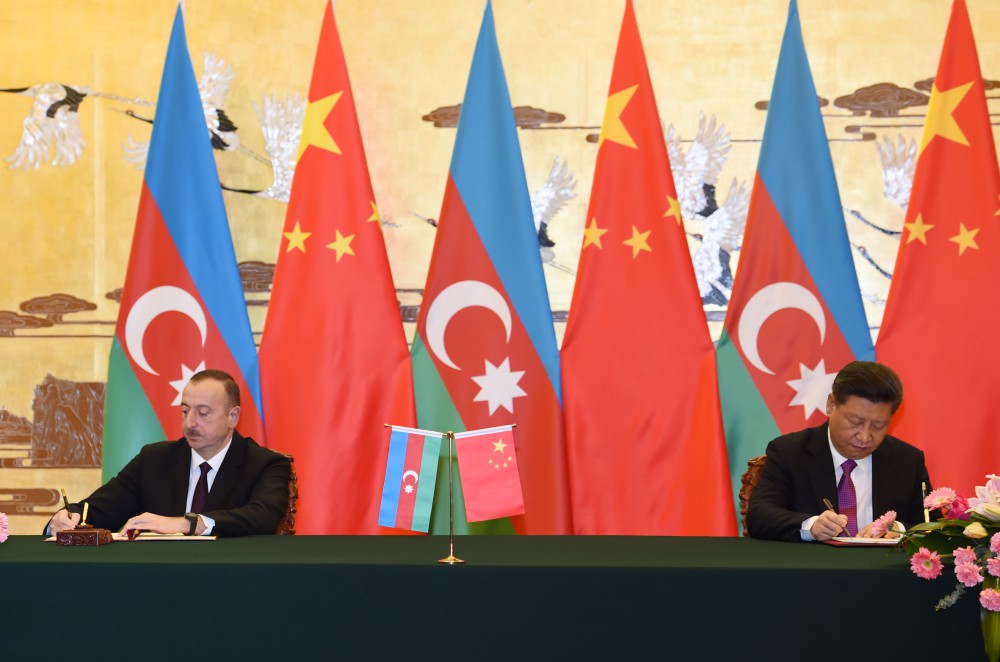In an interview with the website of the Strategic Council on Foreign Relations, Dr. Maryam Varij Kazemi, referring to the memorandum of understanding on energy cooperation between the Republic of Azerbaijan and China, noted: This memorandum of understanding was signed for cooperation in the development of projects including the exploration and development of renewable energy resources with a capacity of 2 gigawatts and also, exchange of experience in the field of remote electrical energy transmission through high pressure direct current cables. In addition, it supports the financial stability and efficiency of the energy sector and will also help to promote the use of renewable energy sources in the Republic of Azerbaijan.
She pointed to cooperation in evaluating opportunities for investment in solar energy on an applied scale, onshore and offshore wind energy, energy storage, and integrated smart energy systems, as well as green hydrogen as other provisions of the agreement and said: In that document, the possibility of studying to connect those projects to the network, environmental impact assessment, geological and topographic surveys of the study areas have also been provided.
The researcher of geopolitical affairs considered the energy sector as being the main priority of the relations between Beijing and Baku and added: Considering that China has made significant progress in the field of alternative energies, it can significantly help the Republic of Azerbaijan to diversify its economy and reduce dependence on oil and gas resources, especially in the field of introducing new technologies, infrastructure renovation, promotion of mutual investment and exchange of information and knowledge related to it.
Varij Kazemi stated that Baku must ensure that its energy resources meet its direct and indirect needs not only to maintain economic growth but also to support regional and global economic initiatives, adding: Considering the prospect of reducing fossil energy consumption and the gradual increase of infrastructures related to the use of renewable energy in countries that consume hydrocarbon energy, the Republic of Azerbaijan tends to establish partnerships and commercial cooperation in the energy sector to avoid economic dependence on oil and gas energy and protect the environment. In the meantime, China is investing extensively to facilitate, promote, and encourage the development of renewable energy in the Republic of Azerbaijan while pursuing other primary objectives.
She added: Due to the strategic location of the Republic of Azerbaijan, as a key player in the field of transport between Europe and Asia through the Trans-Caspian international transportation route, which is known as the “Middle Corridor,” China is considering creating a strategic balance between itself and other regional competitors through that country.
According to the analyst of geopolitical affairs, considering that Baku is a fierce competitor of Moscow in the gas transit sector, which has used containment policy against that country at the time of Russia’s difficult situation, China’s entry into Azerbaijan’s energy market can largely control the development of the influence of regional and global powers that are trying to compete and conflict with Russia, as China’s strategic ally. Economic opportunities shape regional behavior and China is also trying to have a serious presence in the Caucasus and Eastern Europe through economic-commercial-energy exchanges.
Varij Kazemi stated that the interest of the Republic of Azerbaijan in China’s extensive investment has a significant impact on the reconstruction of relations with neighboring countries and greater convergence in the direction of more effective efficiency of energy transit corridors, added: China with the aim of developing and creating diversity in consumption markets and reducing costs, pays attention to the countries that are in the center of energy resources and transit corridors. Although the increase in Azerbaijan’s energy production will not reduce China’s fuel deficit, it will help it to some extent in the volatile and expensive energy market.
She pointed out that the recent agreement between the Republic of Azerbaijan and China while covering issues related to the import and export of oil and gas and the development of new energies, helps to advance China’s approach to resolving or reducing tensions in the Caucasus. Further erosion of stability and security in that region, while changing the map of conflict, can affect the surrounding countries that are allies of China, with negative consequences. From Beijing’s point of view, interaction with regional countries will strengthen their flexibility and help maintain peace and stability.
The researcher of geopolitical affairs, saying that regional stability is essential for local players, neighboring countries such as Russia, Turkey, and Iran, and a political-economic bloc such as the European Union, added: Expansion of China’s relations with the Republic of Azerbaijan by affecting import tariffs and creating export bans or restrictions, leads to the suspension of foreign financial aid. In fact, the agreement with China creates a golden opportunity for the Republic of Azerbaijan to benefit from the new regional order established after the Karabakh war.
While explaining the position of the Republic of Azerbaijan at the center of the passage of several pipelines and large energy projects, Varij Kazemi continued: Baku is interested in rebuilding all economic connections and transport and communication corridors of the region by giving priority to the Trans-Anatolian natural gas pipeline, the Middle Corridor, the North-South International Transport Corridor and the Belt and Road Initiative and play a role as a logistics center and link of Eurasia. This opportunity, along with the country’s energy tools, is also an opportunity for China to have an active presence in the region.
She emphasized that although the United States and India will create obstacles for China in this region by concluding agreements, including the recent agreement in the field of energy, China makes various tactics for its presence. Tactics that may drastically change the security equation of the region.










0 Comments